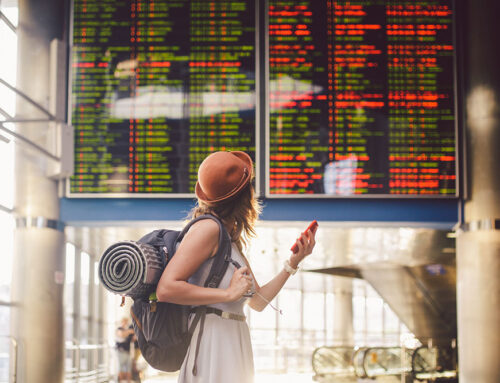Studying abroad is an exciting and life-changing experience. As you prepare for your exciting journey to another country, it is essential to make sure that you have completed all the necessary steps to ensure a stress-free trip.
To make sure that you don’t forget anything, we’ve created the ultimate study abroad checklist to ensure your safety, comfort, and success while traveling.
Here are thirty pre-travel essential steps for all study abroad students:

- Research your destination: It may go without saying, but the first step in preparing for your study abroad experience is to research your destination. Read about the culture, language, and customs of the country you are visiting. You should also research the climate, transportation, and local points of interest. Be sure to consider your personal safety abroad and what areas to avoid ahead of time.
- Review program materials: Read all program materials, including orientation guides, course catalogs, and policies. Understand the expectations for coursework versus free-time to explore. Also, consider some of these travel safety apps for students.
- Obtain necessary documents: Obtain a valid passport, visa, and other required travel documents. Be sure to double-check all expiration dates and requirements ahead of time to make travel a breeze.
- Arrange housing: Research housing options if not provided by your program and arrange your accommodations in advance. Find out where your classes will be so that you don’t choose a location that is too far to commute to class!
- Purchase travel insurance: Consider purchasing travel insurance to protect yourself in case of illness, injury, or other unexpected events. There are many different options out there, and some packages may be offered by your university through the study abroad program at discounted rates. Looking into travel security services in general is not a bad idea.
- Schedule a medical check-up: Visit your doctor and dentist for a comprehensive medical check-up and obtain any necessary vaccinations before leaving. This is good practice so as not to encounter anything unexpected but preventable while abroad, like a bad cavity!
- Pack appropriately: Consider local weather, cultural norms, and personal needs when packing. Try and avoid bringing anything with you that you are afraid to lose, or that furthermore makes you appear wealthy. Dressing in expensive clothing is a great way to identify yourself to potential thieves.
- Learn the local language: Learn basic phrases in the local language to facilitate communication and cultural exchange. Think about where you will be most during your study abroad program. Perhaps you will frequent parks, bars, and restaurants on your off time, or visit ruins and museums. Try and commit to memory the most helpful words and phrases you will need to get around these places.
- Review safety guidelines: Review safety guidelines provided by your program, including emergency contact information for teachers and staff, safety tips, local crime data, and what the procedures are in the event that you get lost. Understand who will be picking you up from the airport if applicable.
- Register with your embassy: Register with your embassy before departure, so they can assist you in case of an emergency. This is never a bad idea and makes it easier if trouble arises to get State Department resources involved.
- Notify your bank and credit card companies: Notify your bank and credit card companies of your travel plans to avoid any issues with your accounts. On that note, consider also not bringing all your cards with you.
- Plan your transportation: Research transportation options, including airport transfers, public transportation, and local transportation options. A subway map ahead of time never hurts!
- Purchase necessary gear: Purchase any gear you may need for your trip, such as a comfortable backpack, comfortable shoes, or weather-appropriate clothing. If you’re going to Costa Rica during rainy season, you are going to need a poncho!

- Obtain a local SIM card: Purchase a local SIM card for your phone to avoid expensive roaming charges. Otherwise, make sure to let your wireless provider know where you’re going ahead of time, and provision yourself with an international data plan accordingly.
- Learn about local cuisine: Research local cuisine, including dietary restrictions and cultural dining practices. Going to a restaurant ahead of time in the States may better prepare you for the spices and tastes of where you’re going.
- Purchase travel adapters: Purchase travel adapters to ensure your electronics will work in your destination country. This seems like something you can overlook – but take it from us, it is easier to figure out ahead of time when the instructions and information on the packaging is in English.
- Obtain local currency: Obtain local currency before departure, or plan to withdraw money upon arrival. It is good to have at least enough for the first couple days of travel on you. Think taxis, airport food, and other miscellaneous expenses.

- Obtain an international driver’s license: Obtain an international driver’s license if you plan to drive during your time studying abroad. Research driving laws, and what is the cost of renting or obtaining a vehicle.
- Research local customs: Learn about local customs and social norms, including appropriate dress, behavior, and etiquette.
- Connect with your program coordinator: Connect with your program coordinator to ensure that you have all necessary information and documentation. Ask if there are any recommended translation or travel security apps for students that they recommend.
- Connect with local organizations: Connect with local organizations or groups related to your interests or studies.
- Connect with other study abroad students: Reach out to other study abroad students before departure to build relationships and networks. Often times, universities have social groups made for just this purpose.
- Prepare for emergencies: Prepare for emergencies by carrying a first-aid kit, local emergency numbers, and a plan of action. Consider downloading a travel security app that has an emergency button function that can comm.
- Review program schedule: Review your program schedule, including classes, excursions, and free time. If books aren’t provided, it may be easier (and cheaper) to buy them before leaving.
- Create a budget: Create a budget for your trip, including expenses for travel, food, housing, and entertainment. Don’t forget to factor in local conversion rates at your destination country!
- Obtain a travel security app: FoneTrac is a patented app and communications system that functions as a check-in and panic-alert tool, offering students a way to stay connected with advice and assistance whenever it is needed. With a history of supporting business travel security, IMG GlobalSecur’s app is a great asset for students too. Any traveler experiencing a personal safety or medical emergency can summon help in an instant by clicking the emergency panic button. For more information, check out https://www.fonetrac-go.com.
- Research local attractions: Research local festivals and things to do, as well as activities, and plan accordingly.
- Obtain necessary travel permits: Obtain necessary travel permits for any off-campus or independent travel.

- Communicate with family and friends: Communicate with family and friends before departure, and regularly update them during your trip.
- Keep an open mind: Keep an open mind and be willing to learn and grow from your experiences. Studying abroad can be a transformative experience, but it requires flexibility, curiosity, and an adventurous spirit.
For other great travel information, we recommend checking out GoAbroad.com, which has lots of resources for teachers, volunteers, students, and travelers in general.


